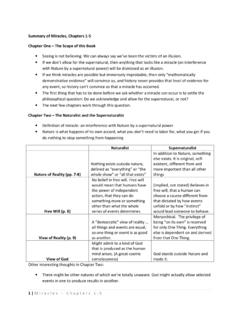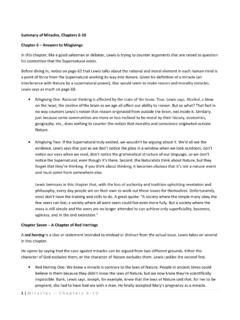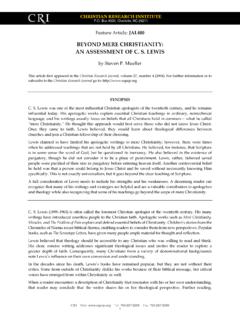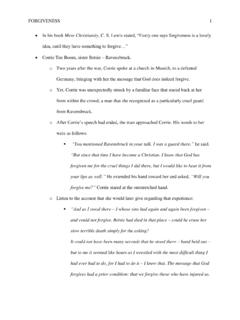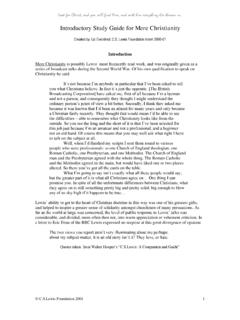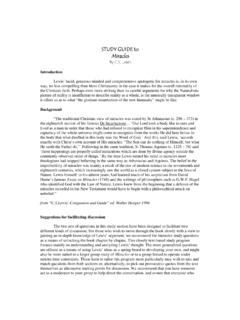Transcription of C.S. LEWIS: MERE CHRISTIANITY - Peter Faur
1 lewis : mere CHRISTIANITY Four-Week Outline Week One Biographical information lewis Highlights of Book One Right and Wrong: Clue to the Meaning of the Universe The Law of Human Nature Objections to the Idea of Moral Law The Reality of the Law What Lies Behind the Law We Have Cause to Be Uneasy Week Two Highlights of Book Two What Christians Believe The Rival Conceptions of God The Invasion The Shocking Alternative The Perfect Penitent The Practical Conclusion Week Three Highlights of Book Three Christian Behavior The Three Parts of Morality The Cardinal Virtues Social Morality Morality and Psychoanalysis Sexual Morality Christian Marriage Forgiveness The Great Sin Charity Hope Faith Faith Week Four Highlights of Book Four First Steps in the Doctrine of the Trinity Making and Begetting The
2 Three-Person God Time and Beyond Time Good Infection The Obstinate Toy Soldier Two Notes Let s Pretend Is CHRISTIANITY Hard or Easy? Counting the Cost Nice People or New Men? The New Men lewis : mere CHRISTIANITY Week One Biographical Information lewis 1898 lewis born in Belfast, Ireland 1908 Mother dies of cancer; lewis blames God 1911 lewis enters Cherbourg House preparatory school, decides he is an atheist 1915 Reads George MacDonald s Phantasies, which had a great impact on his thinking 1916 Enters University of Oxford on a classical scholarship 1917 Drafted into British army for World War I; commissioned as second lieutenant 1918 Captured 60 Germans as prisoners; wounded in action 1919 Returned to Oxford, went on to become a career academic 1925 Became lifelong friends with Tolkien (Christian author, Lord of the Rings) 1929 Confesses that God is God.
3 Not yet Christian 1931 Took a motorcycle ride with his brother to a zoo in England. Said that when he began the trip, he did not believe that Jesus Christ was the son of God. When he finished the trip, he did. 1933 Publishes Pilgrim s Regress, first of a long series of Christian books 1942 Begins radio broadcasts that later are compiled into mere CHRISTIANITY 1956 Marries Joy Davidham Gresham, who died from cancer four years later 1963 Dies on November 22 of osteoporosis Highlights of Book One Right and Wrong: Clue to the Meaning of the Universe The Law of Human Nature o Humans everywhere have a curious idea that they should behave in a certain way, and they can t shake the idea. o As humans, we do not behave in the way we know we should. We know the law of human nature, but we break it.
4 O When people quarrel, they appear to share a common standard of behavior. The quarrel is not usually over the standard but some action that is justified by the offending party as an exception to the standard. o Not a law of nature like the laws of chemistry or physics, which are obeyed. People can choose to obey or disobey the law of human nature. Objections to the Idea of the Law of Human Nature (moral law) o Some say this is just herd instinct, but lewis disagrees. Herd instinct may tell you to help someone in trouble, but the instinct for self-preservation will tell you not to get involved. There is a third force the law of human nature that judges between the two instincts. o When two instincts come into conflict, the stronger does not always win. Moral law usually urges a person to take the weaker instinct and make it the stronger.
5 (Help a drowning person even though you will endanger yourself.) Choosing to help is not acting from instinct. o If moral law is only an instinct, then we should be able to point to an instinct that is always good but none are. Acting on sexual instinct, appetite, even mothering behavior can be good or bad. o Moral law is not just social convention. Just because it s learned and passed along doesn t mean it s a mere human convention. Some things we can learn, like multiplication tables, are real truths, not just something people devised. The reality of the Law o Laws of nature are merely an explanation of how things work. o Laws of human nature (moral law) tell us what people ought to do but don t. o The point: There is more than one kind of reality. o The moral law is really there, not something we made up.
6 It s real, but not a physical reality. What lies behind the Law? o There is something above and beyond the ordinary facts of behavior, something real. o Of the two views of the world materialist and religious one better explains this reality. o Materialist view believes matter and space just happened; no one really knows why. o Religious view believes something is behind the universe, something more like mind than anything else intelligent, conscious, chooses between options. It made the universe, at least in part, so it could create creatures like itself creatures with minds. o Science cannot address or answer this question. Science deals with nature, can t say whether there is something behind nature. We have cause to be uneasy o Critics of religion say it already has been tried, so don t try to turn back the clock (out of date, old-fashioned, irrelevant).
7 O lewis s three comments: The clock should be turned back if it is wrong. There is something behind the moral law. CHRISTIANITY will not make sense until a person faces the facts he has identified. o The being behind the moral law is intensely interested in right conduct fair play, unselfishness, courage, good faith, honesty, truthfulness. In this sense, God is good. o But he is not good in the sense of being indulgent, soft or sympathetic. o Whatever you can learn about God from nature, by observation alone, will not give evidence of a forgiving, personal God. o If there is an absolute goodness, it must abhor most of our actions. o This puts us in a terrible fix. We re in a universe where God is our only possible source of comfort, but we have made ourselves his enemy.

